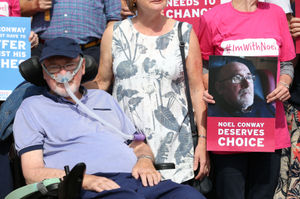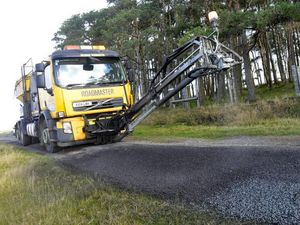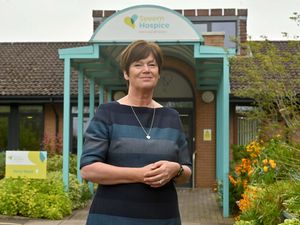Protesters join Noel Conway in Telford as he continues fight for right to die
Protesters in favour of assisted dying joined a man from Shrewsbury who has taken his fight for choice for the end of life to the High Court .
Motor Neurone patient Noel Conway is challenging the current law on assisted dying.
The former lecturer was present at a video link at Telford County Court, joined by several supporters, some carrying posters.
Mr Conway is unable to attend the High Court in person due to his worsening health, but was able to watch proceedings through a live link at the court in Telford Square.
He was joined by his wife and eight supporters, and is being supported by the Dignity in Dying campaign.
Mr Conway said: "It is early days. We are pleased that we are in the middle of the full judicial review which is being fully debated.
"I wasn't available to hear my own counsel and I am aware of our arguments and counter argument. It is hard for me and my wife Carol and other people who we love to live watch and listen to these issues."
Among the supporters with Mr Conway was Helen Barker, a retired law lecturer from Wellington, who said: "Noel is a very close friend. I support assisted deaths because I think if you have a terminal illness you should be able to decide whether or not to have treatment in the same way that you can decide whether or not to have treatment for other conditions.
"It's about having a choice. No one should force you to carry on living longer with something when you no longer want to. I am hoping the decision will be made in your favour."
Submissions were made at the hearing in London, and watched by those in Telford, looking at the outcome of previous cases including that of Tony Nicklinson in 2012, who died shortly after an unsuccessful challenge.

Mr Nicklinson, 58, was paralysed from the neck down after suffering a stroke in 2005 and described his life as a "living nightmare". He died a week after he lost his High Court case to allow doctors to end his life.
Mr Conway, 67, has terminal motor neurone disease and is being supported by Dignity in Dying to bring a judicial review challenging the current law on assisted dying.
He feels that he is prevented from exercising his right to choice and control over his death under the current law and he fears that without a change in the law he may be forced to suffer against his wishes.
Mr Conway, supported by Dignity in Dying, has instructed law firm Irwin Mitchell to bring this case to fight for his right to have the option of an assisted death when he is in his final six months of life.
The hearing, which was scheduled to last until today - with a ruling not expected until the autumn - will see Mr Conway's legal team ask the courts to declare that the blanket ban on assisted dying under the Suicide Act 1961 is contrary to his rights under the Human Rights Act.
Today's proceedings:
Today the High Court was told it was inappropriate for the courts to interfere with Parliament's decision on the "sensitive moral, social and ethical issue" raised by the case of terminally ill Noel Conway.
When Mr Conway has less than six months to live and retains the mental capacity to make the decision, he wishes to be able to enlist assistance from the medical profession to bring about a "peaceful and dignified" death.
The law as it stands means that anyone who helped him would be committing a criminal offence.
He wants a declaration that the Suicide Act 1961 is incompatible with Article 8 of the European Convention on Human Rights, which relates to respect for private and family life, and Article 14, which protects from discrimination.
The case is opposed by the Secretary of State for Justice, with Humanists UK, Care Not Killing and Not Dead Yet UK also making submissions.
It is the first challenge to the existing law since the case of Tony Nicklinson, who suffered from paralysis after a stroke.
That was ultimately dismissed in June 2014 by the Supreme Court, which said it was a matter for Parliament to decide.
After debates in both Houses, Parliament decided, at least for the moment, not to provide for legislative exceptions to the 1961 Act.
James Strachan QC, for the Secretary of State, told Lord Justice Sales, Mrs Justice Whipple and Mr Justice Garnham on Wednesday that Mr Conway's "tragic and distressing" circumstances could only evoke the deepest sympathy.
But, as with other cases, his response was necessarily based on the correct legal approach to the claim as a matter of both precedent and procedure.
"The circumstances which led the Supreme Court to refuse to grant such a declaration in June 2014 have not changed so as to make a different outcome justified today.
"Parliament has very recently decided to reject exactly the sort of change to the existing law which the claimant is relying upon in these proceedings.
"The issue continues to be subject to scrutiny by Parliament as demonstrated by the recent debates in both the House of Commons and the House of Lords and by the anticipated reintroduction of an Assisted Dying Bill in the House of Lords for the 2017/2019 Parliamentary session.
"In those circumstances it remains institutionally inappropriate for the courts to interfere with Parliament's legitimate decision on this notoriously sensitive, moral, social and ethical issue."
Even if it was now considered appropriate, he added, it was clear that there was no incompatibility.



